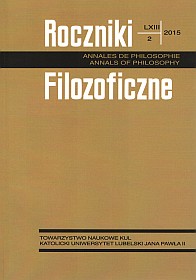The Development of the Notion of Will in the Pagan Ancient Philosophy: Socrates, Plato, Aristotle
Abstract
The aim of the article is to present and analyze the development of the notion of the will in the pagan ancient philosophy. In the context of the views of Socrates, Plato, and Aristotle, the Author presents a lot of Greek intuitions concerning the psychology of moral acts and human action. Firstly, the article examines the doctrine of ethical intellectualism, attributed to Socrates, according to which the cognitive elements are the main motives of our actions. So, it is difficult to find the notion of the will in Socratic anthropology. Secondly, the article gives the interpretation of Platonic anthropology according to which the thymos is the sphere that we can name as “proto-will.” At last, the Author shows how difficult is to find the will in Aristotelian ethics and anthropology despite the fact that Aristotle explicated very closely the relations among beliefs, desires, and the action. Neither proairesis, nor boulēsis can play the role of the will, especially when the will should be something like the power that desires things, makes decisions, and is self-deremined..
References
Arendt, Hannah. Wola. Tłum. Robert Piłat. Warszawa: Czytelnik, 1996.
Arystoteles. Etyka eudemejska. Tłum. Witold Wróblewski. W: Dzieła wszystkie, t. V. Warszawa: Wydawnictwo Naukowe PWN, 1996.
Arystoteles. Etyka nikomachejska. Tłum. Daniela Gromska. W: W: Dzieła wszystkie, t. V. Warszawa: Wydawnictwo Naukowe PWN, 1996.
Arystoteles, O duszy. Tłum. Paweł Siwek. W: Dzieła wszystkie, t. III. Warszawa: Wydawnictwo Naukowe PWN, 1992.
Arystoteles. O niebie Tłum. Paweł Siwek. W: Dzieła wszystkie, t. II. Warszawa: Wydawnictwo Naukowe PWN, 1990.
Arystoteles. Retoryka. Tłum. Henryk Podbielski. Warszawa: PWN, 1988.
Barnwell, Michael. Problem of Negligent Omission: Medieval Action Theories to the Rescue. Leiden, Boston: Brill, 2010.
Bourke. Vernon Joseph. Will in Western Thought: An Historico-Critical Survey. New York: Sheed and Ward, 1964.
Chamberlain, Charles. „The Meaning of Prohairesis in Aristotle's Ethics”. Transactions of American Philological Association 114 (1984): 147–157.
Dihle, Albrecht. The Theory of Will in Classical Antiquity. Berkeley–Los Angeles–London: University of California Press, 1982.
Dilman, Ilham. Free Will: An Historical and Philosophical Introduction. New York: Routledge, 1999.
Frede, Michael. Free Will. Origins of the Notion in Ancient Thought. Berkeley–Los Angeles–London: University of California Press, 2011.
Galewicz, Włodzimierz. „Leontios i trupy. O platońskiej etyce godności”, Kwartalnik Filozoficzny” 26, z. 2 (1998): 47-69.
Galewicz, Włodzimierz. Z Arystotelesem przez greckie tragedie. Część 2: O błądzeniu, przymusie i dobrowolności. Kraków: Wydawnictwo Literackie, 2003.
Górnicka, Joanna. „Obojętność i nie-działanie jako przedmiot moralnej oceny”, Etyka 30 (1997): 127–134.
Heinaman, Robert. „Voluntary, Involuntary, and Choice”. W: A Companion to Aristotle, red. Georgios Anagnostopoulos, 483–497. Malden, MA: Blackwell, 2009.
Irwin. Terence. The Development of Ethics: A Historical and Critical Study, vol. 1. Oxford: Oxford Univesity Press, 2007.
Irwin, Terence Henry. „Who Discovered the Will?”, Philosophical Perspectives 6 (1992): 453–473.
Jaśtal, Jacek. Natura cnoty. Problematyka emocji w neoarystotelesowkiej etyce cnót. Kraków: Wydawnictwo Księgarnia Akademicka, 2009.
Kenny, Anthony. Aristotle’s Theory of the Will. London: G. Duckworth, 1979.
Knuuttila, Simo. Emotions in Ancient and Medieval Philosophy. Oxford: Clarendon Press, 2004.
Legutko, Ryszard. Sokrates. Filozofia męża sprawiedliwego. Poznań: Zysk i S-ka, 2013.
Macintyre, Alasdair. Trzy antagonistyczne wersje dociekań moralnych. Tłum. Michał Filipczuk. Warszawa: WAiP, 2009.
Nussbaum, Martha C. The Fragility of Goodness: Luck and Ethics in Greek Tragedy and Philosophy, revised edition. Cambridge: Cambridge University Press, 2001.
Peters, Francis Edward. Greek Philosophical Terms: A Historical Lexicon. New York–London: New York University Press, 1967.
Platon. Eutydem. Tłum. Władysław Witwicki. Kęty: Antyk, 2002.
Platon. Fajdros. Tłum. Leopold Regner. Warszawa: Wydawnictwo Naukowe PWN, 1993.
Platon. Państwo. Tłum. Władysław Witwicki, t. I-II. Warszawa: Wydawnictwo Naukowe PWN, 1991.
Platon. Protagoras. Tłum. Władysław Witwicki. Warszawa: Wydawnictwo Naukowe PWN, 1991.
Platon. Timajos. Tłum. Władysław Witwicki. W: Dialogi, t. II. Kęty: Antyk, 1999.
Price, A.W. „Aristotle, the Stoics and the will”. W: The Will and Human Action: From Antiquity to the Present Day, red. Thomas Pink and M.W.F. Stone. London and New York: Routledge, 2004.
Reale, Giovanni. Historia filozofii starożytnej. Tłum. Edward Iwo Zieliński, t. II. Lublin: Wydawnictwo KUL, 1996.
Reale, Giovanni. Historia filozofii starożytnej. Tłum. Edward Iwo Zieliński, t. V. Lublin: Wydawnictwo KUL, 2002.
Słownik grecko-polski, red. Z. Abramowiczówna, t. I. Warszawa: PWN, 1958.
Snell, Bruno. Odkrycie ducha. Studia o greckich korzeniach europejskiego myślenia. Tłum. Agna Onysymow. Warszawa: Fundacja Aletheia, 2009.
Sorabji, Richard. „The Concept of the Will from Plato to Maximus the Confessor”. W: The Will and Human Action: From Antiquity to the Present Day, red. Thomas Pink and M.W.F. Stone, 6–28. London and New York: Routledge, 2004.
Copyright (c) 2015 Roczniki Filozoficzne

This work is licensed under a Creative Commons Attribution-NonCommercial-NoDerivatives 4.0 International License.





